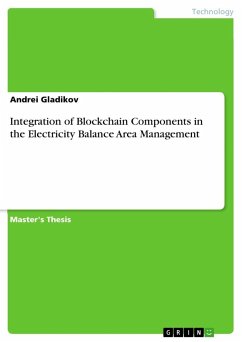
Integration of Blockchain Components in the Electricity Balance Area Management

PAYBACK Punkte
0 °P sammeln!
Master's Thesis from the year 2019 in the subject Energy Sciences, grade: 1.8, University of Freiburg, language: English, abstract: This thesis is aimed to estimate the severity of recent balancing costs fallen onto balancing responsible parties (BRPs), the quality of forecast incentive, and prove a blockchain-based secondary flexibility market with quota mechanism of trading activation rights an efficient and economically viable tool for BRPs for offsetting schedule deviations at short notice. After developing a prosumer-enabled model which is system integrated complying with existing balanci...
Master's Thesis from the year 2019 in the subject Energy Sciences, grade: 1.8, University of Freiburg, language: English, abstract: This thesis is aimed to estimate the severity of recent balancing costs fallen onto balancing responsible parties (BRPs), the quality of forecast incentive, and prove a blockchain-based secondary flexibility market with quota mechanism of trading activation rights an efficient and economically viable tool for BRPs for offsetting schedule deviations at short notice. After developing a prosumer-enabled model which is system integrated complying with existing balancing management, various scenarios of deviations exchange are emulated.The focus of this work is set to justify the sufficiency of strategic value in blockchain technology as the market underlying infrastructure and as a complementary layer for the established data exchange platform. This thesis identifies blockchain benefits and regulatory challenges for synchronization of multiple flexibility providers, creating and managing deviations-conscious balancer communities, resulting in energy balancing costs reduction, enabling innovative business models and additional revenue streams for balancing groups.The increasing uncertainty of the power supply in Germany due to the surge in fluctuating renewable energy, power plant failures and accidental changes in consumption lead to the energy system imbalance. This not only threatens the system security, but also turns into financially punitive consequences for energy market players. Current market-based solutions and the German established data exchange platform with market rules 'MaBiS' do not foster a bottom-up collaboration in balancing groups to timely offset schedule deviations. The capability to modify and/or shift consumption of industrial or commercial end-customers as well as to adjust energy output of generation units gives a unique opportunity for organizing a shared platform for flexibility services exchange to mitigate the risk of paying imbalance tariff.













